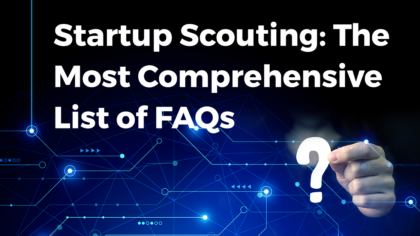Accelerate Productivity in 2025
Reignite Growth Despite the Global Slowdown
Startup scouting is the process of identifying and evaluating early-stage companies with the potential to become successful. This is an important activity for investors, venture capital firms, and corporate innovation teams, as it allows them to identify and support promising startups that align with their investment or innovation strategies. Today, we will address some of the most frequently asked questions (FAQs) about startup scouting. Let’s dive in!
Your Top Startup Scouting FAQs Answered
1. What are the Benefits of Startup Scouting?
- Access to innovative technologies & business models: Startup scouting allows investors and corporate innovation teams to identify and evaluate startups that are working on cutting-edge technologies or pioneering new business models. This can provide you with early access to potentially disruptive innovations and help you stay ahead of the curve.
- Networking & collaboration opportunities: Startup scouting can also provide opportunities for networking and collaboration. You can build relationships with startups and potentially co-invest or partner with them in the future.
- Diversification of investment portfolio: Suppose you are an investor or looking forward to it — by investing in a diverse range of startups, you can diversify your portfolios and mitigate the risk of any one investment performing poorly. Startup scouting lets you identify promising startups in a variety of sectors and stages of development.
You might find this useful: How Data-Driven Startup Scouting gives You a Competitive Advantage
2. How to Evaluate Startups?
- Market opportunity: It is important to assess the size and growth potential of the market the startup is targeting. A startup with a strong value proposition that addresses a large, unmet need in a growing market is more likely to succeed than one targeting a small, saturated market.
- Nature of product or service: A startup’s product or service should be well-defined and differentiated from competitors. It should also solve a real problem or meet a genuine need for the target market.
- Traction: Look for signs that the startup is gaining traction, such as growing revenue, a growing user base, or partnerships with well-known companies. This can be a strong indicator of the startup’s potential for success.
- Finances: Evaluate the startup’s financial health and potential for future funding. This includes considering the startup’s current financial position, as well as its plans for future revenue and growth.
3. What are the Common Mistakes to Avoid in Startup Scouting?
- Failing to do proper due diligence: Thoroughly research and evaluate startups before making an investment. Failing to do proper due diligence can lead to poor investment decisions and potentially costly mistakes.
- Being too focused on a specific industry or stage of development: While it is important to have a clear investment or innovation strategy, you should also remain open to opportunities outside of your immediate focus. Don’t be too narrow in your focus and be open to considering startups in a variety of industries and stages of development.
- Relying too heavily on financial projections: Financial projections can be useful, but they are often based on assumptions and estimates. Don’t rely too heavily on financial projections and be sure to consider other factors, such as market readiness, type of product or service, traction that it gets, etc. while evaluating startups.
4. What are the Best Practices for Conducting Effective Startup Scouting?
- Define your criteria: Clearly define your investment or innovation criteria before you start scouting. This will help you focus your efforts and ensure that you are evaluating startups that align with your goals.
- Use a structured evaluation process: Develop a structured process for evaluating startups. This includes conducting due diligence on the team, market opportunity, product or service, traction, and finances. This ensures that you are making informed decisions and not relying on gut feelings alone.
- Network & build relationships: Network and build relationships with other investors, entrepreneurs, and industry experts. These connections provide valuable insights and lead to investment or collaboration opportunities.
- Stay up-to-date: Keep up-to-date with industry trends and developments. This helps you identify new opportunities and stay informed about the latest innovations in your field.
Read more about this here: What is Startup Scouting & How to do it Effectively
5. How to Attract Relevant Startups?
- Incubators & accelerators: Incubators and accelerators are organizations that provide support and resources to early-stage startups. Many of these organizations hold pitch events or demo days, where startups can showcase their products or services to potential investors.
- Startup competitions: Startup competitions, such as pitch events or hackathons, are another way to discover and evaluate startups. These events provide an opportunity for startups to present their ideas to a panel of judges and potentially win funding or other prizes.
- Online platforms: There are a number of online platforms that connect investors and or big corporations with startups. These platforms allow investors to search for startups by location, industry, and stage of development, and provide information about the startups’ products.
This is where our Startup Discovery Platform comes into the picture. Let’s explore how our product can make your startup scouting process much more streamlined and efficient, and how it can cater to most of the answers to the list of startup scouting FAQs!
Discover the #1 Startup Scouting Platform
As artificial intelligence (AI) continues to progress, data is playing a larger role in the innovation process. The good news is that you can use data to gather insights and make informed decisions.
Wondering how?
We, at StartUs Insights, develop a Discovery Platform that helps companies like yours to keep a tab on emerging startups, scaleups, and technologies that matter to you.
Powered by Big Data and AI, our platform covers over 3 million startups and scaleups globally!
So, what does this mean for you?
- Goodbye to Manual Labour — Replace weeks of desk research with just one click. You get all the information you need on startups, scaleups, technologies, and trends, all from one single source.
- Access to 100x Faster & Exhaustive Scouting — Get the best results out of over 1.8 billion data points from the WWW, startup ecosystem, databases, company aggregators, publications, research, and patents, in a jiffy!
- Deep Innovation Graph — Our proprietary and unique data in combination with our fast and exhaustive search process allows you to discover hidden diamonds long before anyone else does.
- Large-Scale Search Capabilities — Our highly performant search process allows you to manage even the largest queries — 1 000 keywords? No problem!
Read this next: Discover the #1 Startup Scouting Platform
Why is our platform better than others?
- When you already know companies that matter to you, you can easily find more like them by using the Similar Company Search.
- Find, mark, and manage relevant solutions all in one tool using the Scout Manager.
- Once you identify relevant solutions, simply export the list and integrate it into your CRM.
You might find this useful: Find 10X Business Opportunities with Data-Driven Startup Scouting
That is not all. We also provide you with a Trend Intelligence solution that gives you access to 29 500+ trends and technologies. This allows you to:
- Anticipate Future Trends & Business Opportunities — we deploy advanced analytics to hundreds of thousands of trusted sources on startups, emerging technologies, and industry trends to provide you with accurate insights into trends impacting your industry in a short amount of time.
- Stay Up to Date — Monitoring the business ecosystem continuously ensures the identification of emerging technologies, trends, and opportunities. Our service provides you with regular updates on recent developments through Trend Intelligence Reports, Innovation Maps, and Real-time Databases.
Also read: How does Trend Analysis drive Innovation
All this structured data and granular analysis of the same along with the monitoring of emerging startups and technologies in your industry and beyond helps you improve your startup scouting process. We ensure that your decision-making is always built on the most recent insights available.
Are these startup scouting FAQs useful for you? Would you like to try our Startup Scouting Platform?

![Business Resilience Planning: 10 Strategies & Technologies to Tackle the Current Market [2025-2026]](https://www.startus-insights.com/wp-content/uploads/2025/06/Business-Resilience-Planning-SharedImg-StartUs-Insights-noresize-420x236.webp)
![10 Biggest Business Trends: What to Invest in, Build, and Watch Closely [2025-2030]](https://www.startus-insights.com/wp-content/uploads/2025/06/Business-Trends-SharedImg-StartUs-Insights-noresize-420x236.webp)




